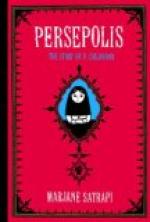True, in the winter it was harder, and they had to rise in the darkness and the bitter cold, and they had seldom as much as they could have eaten any day, and the hut was scarce better than a shed when the nights were cold, although it looked so pretty in warm weather, buried in a great kindly-clambering vine, that never bore fruit, indeed, but which covered it with luxuriant green tracery all through the months of blossom and harvest. In winter the winds found many holes in the walls of the poor little hut, and the vine was black and leafless, and the bare lands looked very bleak and drear without, and sometimes within the floor was flooded and then frozen. In winter it was hard, and the snow numbed the little white limbs of Nello, and the icicles cut the brave, untiring feet of Patrasche.
But even then they were never heard to lament, either of them. The child’s wooden shoes and the dog’s four legs would trot manfully together over the frozen fields to the chime of the bells on the harness; and then sometimes, in the streets of Antwerp, some housewife would bring them a bowl of soup and a handful of bread, or some kindly trader would throw some billets of fuel into the little cart as it went homeward, or some woman in their own village would bid them keep some share of the milk they carried for their own food; and then they would run over the white lands, through the early darkness, bright and happy, and burst with a shout of joy into their home.
So, on the whole, it was well with them, very well; and Patrasche, meeting on the highway or in the public streets the many dogs who toiled from daybreak into nightfall, paid only with blows and curses, and loosened from the shafts with a kick to starve and freeze as best they might,—Patrasche in his heart was very grateful to his fate, and thought it the fairest and the kindliest the world could hold. Though he was often very hungry indeed when he lay down at night; though he had to work in the heats of summer noons and the rasping chills of winter dawns; though his feet were often tender with wounds from the sharp edges of the jagged pavement; though he had to perform tasks beyond his strength and against his nature,—yet he was grateful and content: he did his duty with each day, and the eyes that he loved smiled down on him. It was sufficient for Patrasche.
There was only one thing which caused Patrasche any uneasiness in his life, and it was this. Antwerp, as all the world knows, is full at every turn of old piles of stones, dark and ancient and majestic, standing in crooked courts, jammed against gateways and taverns, rising by the water’s edge, with bells ringing above them in the air, and ever and again out of their arched doors a swell of music pealing. There they remain, the grand old sanctuaries of the past, shut in amidst the squalor, the hurry, the crowds, the unloveliness and the commerce of the modern world, and all day long the clouds drift and the birds circle and the winds sigh around them, and beneath the earth at their feet there sleeps—Rubens.




